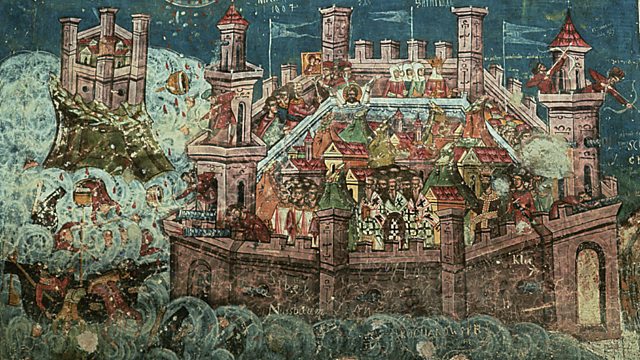Constantinople Siege and Fall
Melvyn Bragg discusses the 1453 siege of Constantinople. A bitter and bloody 53 days that ended a thousand years of the Byzantine Empire.
Melvyn Bragg and guests discuss the siege of Constantinople in 1453. When Sultan Mehmet the Second rode into the city of Constantinople on a white horse in 1453, it marked the end of a thousand years of the Byzantine Empire. After holding out for 53 days, the city had fallen. And as one contemporary witness described it: “The blood flowed in the city like rainwater in the gutters after a sudden storm”. It was the end of the classical world and the crowning of an Ottoman Empire that would last until 1922.Constantinople was a city worth fighting for – its position as a bridge between Europe and Asia and its triangular shape with a deep water port made it ideal both for trade and defence. It was also rumoured to harbour great wealth. Whoever conquered it would reap rewards both material and political. Earlier attempts to capture the city had largely failed – so why did the Ottomans succeed this time? What difference did the advances in weaponry such as cannons make in the outcome of the battle? And what effect did the fall of Constantinople have on the rest of the Christian world?With Roger Crowley, author and historian; Judith Herrin, Professor of Late Antique and Byzantine Studies at King's College London; Colin Imber, formerly Reader in Turkish at Manchester University.
Last on
Broadcasts
- Thu 28 Dec 2006 09:00���˿��� Radio 4
- Thu 28 Dec 2006 21:30���˿��� Radio 4
Featured in...
![]()
Renaissance—In Our Time
Browse the Renaissance era within the In Our Time archive.
![]()
Medieval—In Our Time
Browse the Medieval era within the In Our Time archive.
In Our Time podcasts
Download programmes from the huge In Our Time archive.
The In Our Time Listeners' Top 10
If you’re new to In Our Time, this is a good place to start.
Arts and Ideas podcast
Download the best of Radio 3's Free Thinking programme.
Podcast
-
![]()
In Our Time
Melvyn Bragg and guests discuss the ideas, people and events that have shaped our world.



